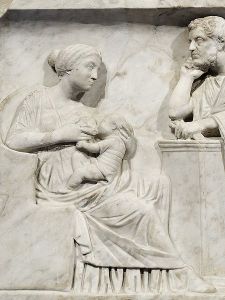
Ὁ δὲ τρόπος ὁ τοῦ λουτροῦ καὶ τῆς τρίψεως τοιοῦτός ἐστιν. δεῖ πρῶτον οἰκημάτιον ἐκλέγειν συμμέτρως θερμὸν καὶ τὴν αὐγὴν ἀποκλίνειν. καθίσασαν δὲ τὴν μαῖαν καὶ ἐπὶ τῶν μηρῶν καὶ ἐπὶ τῶν γονάτων ἁπλώσασαν ὠμόλινον 〈ἢ〉 ῥάκος, ἔπειτα κατακλίνειν τὸ βρέφος καὶ ἀποσπαργανώσασαν ἀλείφειν ἐλαίῳ χλιαρῷ· εἶτα κατέχουσαν τῇ εὐωνύμῳ χειρὶ τὸν δεξιὸν βραχίονα ὑπὸ τὴν μασχάλην, ὥστε τὸ στῆθος αὐτοῦ τῷ πήχει προσαναπαύεσθαι παρεγκεκλιμένου ποσῶς ἐπὶ τὸ δεξιὸν πλευρόν, καταντλεῖν διὰ τῆς δεξιᾶς χειρὸς ὕδωρ θερμόν τε καὶ εὔκρατον ὡς πρὸς τὴν τοῦ βρέφους εὐαρέστησιν· τὸ γὰρ ὡς πρὸς ἡμᾶς εὔκρατον ζεστότερον ἀκμὴν τῷ νηπίῳ διὰ τὴν ὑπερβάλλουσαν τρυφερίαν τοῦ σώματος. παρεπιχέειν δέ τινα κατὰ λόγον ἁρμόσει ὕδωρ θερμόν, ἐπεὶ ψύχεται τὸ πρῶτον, καὶ καταντλεῖν μέχρις ἂν εὐανθὲς γένηται τὸ σῶμα καὶ ὁμαλῶς θερμόν. εἶτα στρέφειν τὸ βρέφος καὶ ὑπτιωθέντος αὐτοῦ προσαπολούειν καὶ ἀποκαθαίρειν τὰ μηρία καὶ τὴν ἕδραν καὶ τὰ περὶ τὸν τράχηλον καὶ τὰ περὶ τὰς μασχάλας, ῥύπος γὰρ αὐτοῖς περιφύεται, κἄπειτα λοιπὸν εἰς καθαρὸν ὕδωρ ὴ ἔλαιον ἀποβαπτομένῳ τῷ λιχανῷ τὰ ἐγκείμενα τῷ στόματι σίελα κομίζεσθαι καὶ ἡσυχῆ γλῶττάν τε καὶ οὖλα καὶ χαλινὰ διαψηλαφᾶν, κούφως δὲ θλίβειν τὸ ἦτρον εἰς ὑπόμνησιν ἀπουρήσεως. μετὰ δέ τινας ἡμέρας καὶ διὰ γαλακτώδους ὕδατος μετὰ τὸ θερμὸν ἐθίζειν αὐτὸ λοῦσθαι, χάριν τῆς πρὸς τὴν ψυχρολουσίαν συνηθείας, ὑφ’ ἧς δυσπερί ψυκτον φυλαχθήσεται.
(Soranus, Gunaikeia 2.31(100))
The method of bathing and massage is as follows: One must first select a small room which is moderately warm, and must exclude bright light. After the midwife has sat down and spread a linen towel <or> a piece of cloth over her lap and knees, she should then lay the newborn down and, having taken off the swaddling clothes, anoint it with lukewarm olive oil. Next, with her left hand she should hold its right arm under the armpit, so that its breast rest upon her forearm while it is a little inclined toward the right side; and with her right hand she should pour warm water, well-tempered to the pleasure of the newborn. For water that is well-tempered for us is yet too hot for the child because of the extraordinary delicacy of its body. And it will be proper in proportion to add some warm water when the first becomes cool and to pour water over the body till it becomes flushed and evenly warm. Then she must turn the newborn and while it is on its back she should furthermore wash and cleanse its thighs, buttocks, the parts around the neck and armpits (for the dirt clings to them)·. Then, finally, with her forefinger dipped into pure water or olive oil, she should remove the saliva which is in the mouth, should handle gently the tongue, the gums, and the corners· of the mouth and should press lightly the lower abdomen to provoke urination. But after some days the newborn should become accustomed to being washed with tepid water after the warm water, with a view to the practice of cold bathing, which will keep it f rmn becoming easily chilled. (tr. Owsei Temkin)



